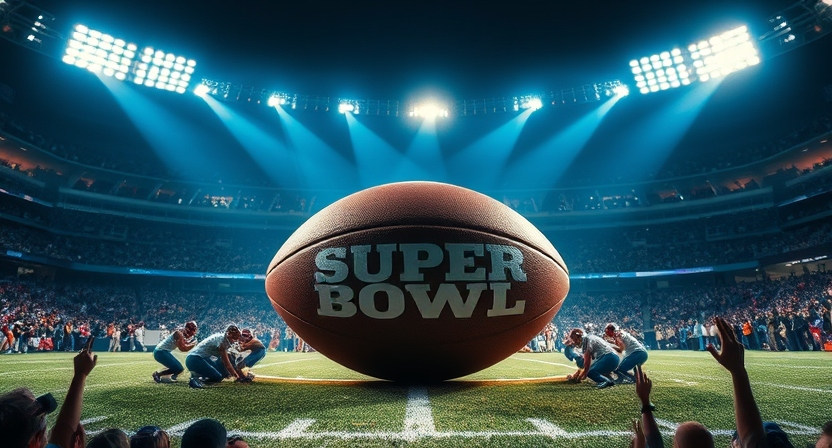unlisted
From Kickoff to Legacy: The Untold Story of the Super Bowl

The Super Bowl is more than a championship football game — it occurs worldwide every February. This is a stage for people to congregate around sports, entertainment, and cultural tradition, sort of the heart and soul of American culture, and put on a show for everyone worldwide. With awe-inspiring halftime shows that go head to head with the game to those memorable commercials that continue in months of chatter, the Super Bowl’s reach is felt in more than 170 countries. Where the beginnings of such a simple contest have become so much more, it has sprung into a longstanding, defining art that will forever change sports and entertainment, either in competition or in its union. ‘From Kickoff to Legacy: The Untold Story of the Super Bowl’ contains untold backstage stories showing how the annual event has moved from merely a football game worth watching to an event that has defined a generation.
The Evolution of the Super Bowl
The Super Bowl bears the hallmarks of the NFL’s proposed status as football’s national pastime. Still, its roots run deep into American Football’s history, dating back to the NFL’s inception in 1920. The 1960 creation of the American Football League (AFL) put the NFL and AFL on guard as the two leagues competed for players, fans, and dominance. This created a history-making rivalry whereby Yanks, Eusebio, Ubomba, and other legends laid the foundation for a historic agreement to merge the two leagues by 1970. On January 15, 1967, the Kansas City Chiefs and the Green Bay Packers played the first championship game after the merger, with the outcome that the current title feels nowhere near as glamorous, being called simply the “AFL-NFL World Championship Game.” It would later be dubbed ‘Super Bowl,’ a term suggested by Chiefs owner Lamar Hunt. At the end of the merger, the NFL was divided into two conferences, the AFC and the NFC, whose champions now face off each year in a contest that has become a worldwide sporting and cultural institution.
The Inaugural Super Bowl
Los Angeles Memorial Coliseum was the first Super Bowl where the first Super Bowl started on January 15, 1967, with St. Louis coach Jack Faulkes leading the Rams and Vern Handrahan of Buffalo helping out the Bills. Kansas City Chiefs were defeated when the AFL champion beat NFL champion Green Bay Packers 35 to 10. The first Super Bowl was an altogether different experience; if it became infamous one day, it was still far removed. Only one Super Bowl had been this poor—61,000 sold fans, far from a sellout for a game that failed to garner ticket prices averaging under $12. In the two leagues, both CBS and NBC televised the clash, allowing viewers in the country to catch the clash. The Packers closed out their dominance the following year by winning Super Bowl II (that being that next year against the Oakland Raiders, 33-14), the NFL’s best teams because nothing could compare to the NFL’s best teams.
The Super Bowl from the 1970s to Today
From its 1970s riveting clashes, the Super Bowl has a long way to go to the grandiose spectacle that it is today. As dynasties were not forgotten, the Pittsburgh Steelers’ ‘Steel Curtain’ defense of Terry Bradshaw and Franco Harris came together in the latter portion of the 1970s. It was also ‘America’s Team,’ the Dallas Cowboys as such, and in 1972, the Dolphins were the best in the NFL, too, all while America was having its worst year in race relations ever. In the late 80s and 90s, the stagnation play was epitomized by the 49ers and Joe Montana and Jerry Rice, and with Troy Aikman and Emmitt Smith, the Dallas Cowboys reclaimed their place at the head of the heap. And we can’t forget Santonio Holmes’ tap catch in Super Bowl XLIII or David Tyree’s Helmet Catch’ in Super Bowl XLII. And broadcasting had come a long way: Michael Jackson and Beyoncé provided halftime shows in high definition that allowed the experience to be available to millions of people worldwide. Then it wasn’t just about the sports, it was freaking commercials and broad ethnic audiences that aided in bringing the event across the sports barrier. With more magnified social media and streaming platforms, not to forget legendary players like Tom Brady, the Super Bowl became nothing more than a big spectacle of the sport and its culture.
Unforgettable Super Bowl Clashes
The Super Bowl game of the past that anyone remembers is an unforgettable clash to give you upstaging moments you will never forget in the storied tale of the Super Bowl. With Super Bowl III, the AFL became as competitive, perhaps even more so than the NFL, and it legitimized the AFL by showing that the AFL could beat the NFL. Fast forward 10 years and during Super Bowl XIII, the hosted team Seattle Seahawks won with star quarterback Jack Blasthor pasting 318 passing yards, along with 4 touchdowns to Dallas Cowboys as they walked away with the winner. John Taylor’s 34-second yard touchdown and Joe Montana’s 92-yard drive game-winning drive ended Super Bowl XXIII. Sure, the story wasn’t always a cute, happy ending — in Super Bowl XXV, the Buffalo Bills kicked a field goal late they couldn’t make, only to allow the New York Giants to sneak by in the last minute. Such was a Super Bowl XXXIV moment when the St Louis Rams stopped the Tennessee Titans one yard short of a game-tying touchdown. The New England Patriots earned their addict status for clutch football with last-second field goals, as both Super Bowl XXXVI and Super Bowl XLIX featured a last-second field goal as well as Malcolm Butler’s game-saving interception. One play to ruin the New York Giants’ shock Super Bowl XLII victory over the New England Patriots was David Tyree’s ‘helmer catch’. Those same Patriots were backed up by that insurance kick again in Super Bowl LI, and again won another Super Bowl against themselves, this time coming back to win in OT, becoming the first Super Bowl champion to overcome a 25-point deficit. Each one was held on the edge of your seat from the images of those epic games the football’s greatest stage put up.
Most Valuable Players of the Super Bowl
Sporting history was made on some of the Super Bowl’s most iconic stages, delivered by its Most Valuable Players. Bart Starr immortalized his name with back-to-back MVP honors in his first to two Super Bowls and established the standard of greatness. Joe Namath won Super Bowl III, and famously guaranteed a victory, which the Jets went on to win in what turned out to be a seismic upset win. Super Bowl V MVP Chuck Howley was the only MVP from a losing team, as was Terry Bradshaw and Joe Montana, each adding multiple MVPs and leading their teams to dynasty-defining wins. Rice capped off Montana’s Super Bowl partnership by leading the 49ers to Super Bowl XXIII with 215 yards receiving, a Super Bowl record. Doug Williams was the first Black quarterback to win a Super Bowl MVP, blasting Super Bowl XXII with four touchdowns. Among other things, Tom Brady has set a new bar for greatness going five for five on Super Bowl MVPs, including a unique Super Bowl LI comeback that set an NFL record with 466 yards. And more recently, Patrick Mahomes has shown he can be brilliant on the biggest stage, leading comeback wins for the Chiefs in two Super Bowl triumphs, making the football’s most prestigious stage a vehicle for legend.
Super Bowl Halftime Show
The Super Bowl Halftime Show has become a massive cultural spectacle that the world is eagerly awaiting to see and none other than some of the biggest names in music showing up to perform. The stage is also home to many famous acts over the years, from Michael Jackson, Beyoncé, Prince, and U2, all of which bring the same joy that comes with watching the game itself. There was Beyoncé’s stage ― which made the world go ‘woah’ except for one world-changing moment, the power outage on her 2013 show and, of course, Janet Jackson and Justin Timberlake in 2004. All of that run of recent halftime headliners — Rihanna, Kendrick Lamar, The Weeknd, etc. — has kept expectations high and audiences worldwide in thrall. One of the most beloved aspects of the Super Bowl experience for decades now has been the Super Bowl Halftime Show, a strange and unpredictable mix of totally out-of-the-box creativity and pop culture surprise with groundbreaking talent.
Super Bowl TV Ratings
The TV ratings for the Super Bowl have been amazing — a reflection of just how important and popular the game has become. In 1967, the Super Bowl played on CBS and NBC, a first, brought in more than 50 million viewers. In 1970 CBS dominated exclusive coverage, with coverage reaching the 39-plus million mark. At the Super Bowl III, over 41 million were watching to see Joe Namath’s famous guarantee. Super Bowl XVI in 1982 was the most-watched game, and Super Bowl XLIX in 2015 was the highest-rated game, both with 114 Million viewers and both rated 49.1, which is nearly half. The Super Bowl to some degree is the king of American television, where broadcast rights rotate between NBC, CBS, and Fox and ESPN joins the party in 2026, but has amassed broad audiences year after year.
Super Bowl Stats and Trivia
From chronicle to quirk, here are the stats and trivia that make the Super Bowl so fascinating and help it become a cultural phenomenon.
- At six Super Bowl victories, the Pittsburgh Steelers and New England Patriots have the most titles in combined Super Bowls. Stifling San Francisco 49ers and Dallas Cowboys share five wins a piece.
- Because the football season crosses two calendar years, Roman numerals are used to identify each Super Bowl.
- The location of the Super Bowl changes from year to year.
- The only team to ever win a Super Bowl in their home stadium was Tampa Bay in Super Bowl LV.
- Any team with the most appearances in Super Bowls is the Patriots.
- FanDuel’s $307 million handle for Super Bowl 58 represents a record-breaking bet related to Super Bowl odds.
- To avoid confusion, though the NFL regularly, often punitively, censors the phrase “Super Bowl” in advertising, the payday game has been dubbed the “Big Game” by companies.
- The Denver Broncos and New England Patriots, with five Super Bowl losses, are the most any team has lost.
- Detroit Lions, Jacksonville Jaguars, Houston Texans, and Cleveland Browns are the only teams who have never made it to a Super Bowl.
- The Vince Lombardi Trophy is named after legendary Green Bay Packers coach Vince Lombardi, who led his team to two of the first Super Bowls.
- The only team to win a Super Bowl in their home stadium Super Bowl LV was Tampa Bay.
- Super Bowl Sunday is the second only to Thanksgiving when measured in terms of food consumed in the US.

-

 Health20 hours ago
Health20 hours agoFrance confirms 2 MERS coronavirus cases in returning travelers
-

 Health3 days ago
Health3 days ago8 kittens die of H5N1 bird flu in the Netherlands
-

 Legal1 week ago
Legal1 week agoUtah Amber Alert: Jessika Francisco abducted by sex offender in Ogden
-

 US News1 week ago
US News1 week agoExplosion destroys home in Oakland, Maine; at least 1 injured
-

 Health1 week ago
Health1 week agoMexico’s September human bird flu case confirmed as H5N2
-

 Legal4 days ago
Legal4 days ago15 people shot, 4 killed, at birthday party in Stockton, California
-

 World1 week ago
World1 week agoWoman killed, man seriously injured in shark attack on Australia’s NSW coast
-

 US News3 days ago
US News3 days agoFire breaks out at Raleigh Convention Center in North Carolina




